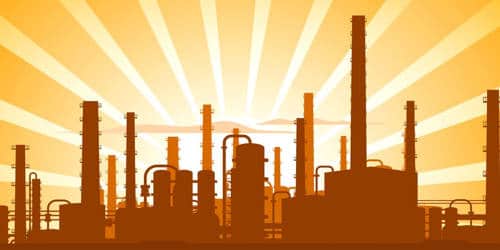Industrialization is the procedure by which an economy is transformed from mainly agricultural to one based on the manufacturing of goods. Individual physical labor is often replaced by mechanized mass production, and craftsmen are replaced by assembly lines.
Industrialization is mainly of two types:
(A) Such materials should be produced which are at present imported from the abroad e.g. production of superior quality of cloth.
(B) Such materials should be manufactured for which raw materials may be imported from abroad, and utilizing the cheap labor of this county, those items may be produced and exported abroad, e.g. garments and ceramic industries.
Cloths being imported from outside and by utilizing cheaper local labor garments are produce and export. It is a profitable business. Unplanned growth of industries deteriorates the environments in many ways. Mills and factories should not be established in human habitation. Because
- Industrial smoke pollutes the air of the locality.
- If unused and excess raw materials and by-products are, not removed properly, these may often decompose and pollute both soil and air.
- Often in the name of by-products, the industrial wastes are thrown to the river or other water reservoirs. As a result, the water of the reservoir become polluted and may cause harm to fishes and other aquatic animals living there. Use of this polluted water may also do harm to human beings. So industries should not be established here and there in an unplanned way.
- If industries, producing high sounds are established in human localities, people of those areas will become the victim of sound pollution. In this way, unplanned industrialization directly or indirectly may affect the environment. Unplanned industrialization deteriorates the public hygiene of the environment. So before establishing any industry in an area, the above factors should carefully be taken into consideration.
Characteristics of industrialization include economic growth, a more efficient division of labor, and the use of technological innovation to solve problems as opposed to dependency on conditions outside human control.
(i) Technological Development:
Technological factors include a degree of mechanization, technical know-how, product design, etc. Improvement in any of the technological factors will contribute towards the increase in industrial productivity.
(ii) Quality of Human Resources:
Manpower plays a significant role. If the labor force is not sufficiently qualified and/or is not properly motivated, all the steps taken to increase the industrial productivity will have no result a employees’ performance on the productivity of any industrial unit.
(iii) Availability of Finance:
The greater the degree of mechanization to be introduced, the greater is the need for capital.
(iv) Managerial Talent:
Professional managers are required to make better use of new technological development. The managers should be devoted towards their profession and they should understand their social responsibilities towards the owners of the business, workers, customers, suppliers.
(v) Government Policy:
The Government should frame and implement such policies that create favorable conditions for saving, investment, a flow of capital from one industrial sector to another and conservation of national resources. The Government should flow the taxation policy which does not discourage the further expansion of the business.











